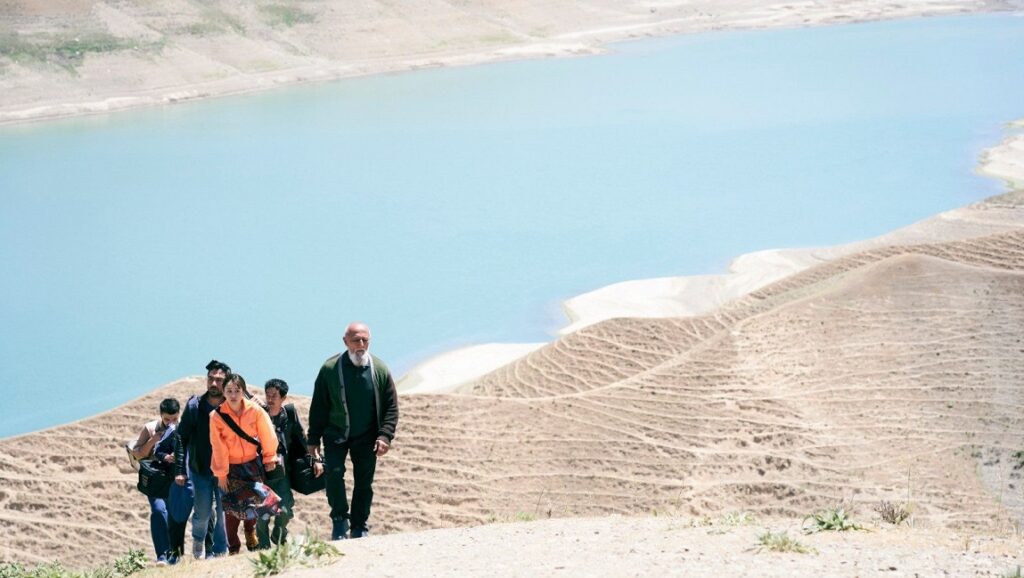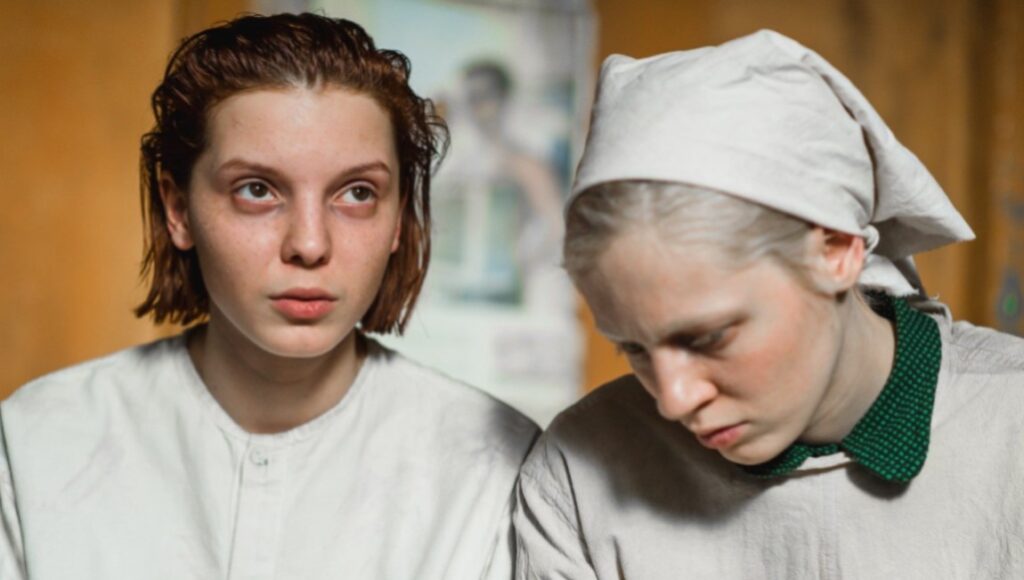Our first dispatch from the 2019 Toronto Film Festival (which runs from Sept. 5 – 15) finds us finally catching up with a lot of titles from this year’s Cannes Film Festival (Bong Joon-ho’s Parasite, Celine Sciamma’s Portrait of a Lady on Fire, the Dardennes’ Young Ahmed, and Michael Angelo Covino’s Un Certain Regard title The Climb) in addition to discovering some new titles from big auteurs with the rest of the festival-going audience (Hirokazu Kore-eda’s recent Venice Film Festival opener The Truth and Kiyoshi Kurosawa’s To the Ends of the Earth, which just premiered at Locarno). TIFF has an important role to play as a kind of collating force — bringing together films from throughout the year under one tent, so to speak. But it’s also still an exciting fest for premieres, and there are many of those coming up. So stick with us over the next two weeks as we roll out our extensive coverage.
Parasite
Parasite, the seventh feature by acclaimed Korean auteur Bong Joon-ho, is symbiotically connected, through its English title, to the director’s earlier monster movie The Host. Bong’s latest film is about a monster as well, only this time the monster isn’t some fish-like behemoth terrorizing the South Korean populace. Instead, it’s the corrosive income inequality that’s a feature — it’s decidedly not a bug — of late capitalism. Parasite could have been alternately titled Rich Family, Poor Family, since this is the main dynamic Bong explores in both thematic and visual terms. The rich family lives in a sprawling hilltop mansion, while the poor one dwells in a cramped, squalid semi-basement apartment. We’re introduced to the poor family first, which consists of dad Ki-taek (Bong regular Song Kang-ho), mom Chung-sook (Chang Hyae-jin), and brother and sister Ki-woo (Choi Woo-shik) and Ki-jung (Park So-dam). All are currently unemployed, yet they’re scratching and surviving, just like the people on the TV show Good Times. Their only initial source of income is folding pizza boxes for a local establishment. Ki-woo catches a break when an old friend recommends him for a gig as a home English tutor for Da-hye (Jung Ziso), the daughter of an affluent IT executive Mr. Park (Lee Sun-kyun). The rest of the rich family consists of Park’s wife Yeon-kyo (Cho Yeo-jeong) and young son Da-song (Jung Hyeon-jun). With the help of forged credentials fashioned by his sister, Ki-woo lands the job. Learning that Yeon-kyo’s looking for an art tutor for Da-song, Ki-woo recommends his friend “Jessica,” who’s actually his sister. Thereafter, the poor family infiltrates the rich family by replacing the Parks’ servant staff with themselves one by one while concealing their familial relation; it’s an invasion of the domestic job snatchers. To reveal much more of the narrative would be as criminal as the behavior of some of the characters themselves. Parasite is considerably smaller-scaled than Bong’s previous blockbusters Snowpiercer and Okja, but it’s no less thematically ambitious and no less twisted in its humor and horror. Bong has created a shape-shifter of a movie, and if its caustic satire is less the precision cutting of a scalpel and more the attack of a blunt object — much like the large stone that figures prominently in the film’s bloody final third — this detracts not a whit from the urgent, visceral power of Bong’s subterranean class rage blues. Christopher Bourne
To the Ends of the Earth
Kiyoshi Kurosawa has been here before. Not to Uzbekistan, where his newest film is set — and which is indeed new territory, geographically speaking — but to this border zone openly contested by opposing modes, genres, and moods. To the Ends of the Earth begins as a kind of travel film, or more precisely, as a document of a TV crew failing to produce one: The host, Yoko (Japanese pop singer Atsuko Maeda, now a regular Kurosawa collaborator), can’t muster the pep required to perform her role as world ambassador for audiences back home, who are conditioned to believe that foreign lands uniformly provoke wonderment and irrepressible perkiness, when in fact disappointment and displacement prevail. Feeling lost, and in the face of escalating, if minor, production troubles, Yoko abandons the shoot, strikes out on her own, and penetrates, with mounting dread, ever more uneasy terrain. She might have some reason to be afraid given her tour guide, though Kurosawa’s reputation as a J-horror pioneer remains frustratingly overblown: More often than not, he journeys to different destinations altogether, where fear — of the other, of the self — is merely a byway on the path to transformation. A midway sequence that suspends Yoko in the dizzyingly alien halls of Uzbekistan’s national opera, and concludes when she emerges from this thicket of arabesques into an empty theater, where she takes the stage and pierces the tension with an aria, is the film’s trajectory in ornately crafted miniature. At this point, her sojourn only half completed, Yoko has discovered that suspension — between home and abroad, trembling and ecstasy, the horror movie and the musical — leaves a person, or a work of art for that matter, restless, uprooted, and potentially quite alone. But she has farther to go before she will learn that such feelings are the iron upon which explorers are made. Kurosawa learned this long ago, of course, and To the Ends of the Earth allows the director to once again test his mettle in risk-filled territory, territory that he alone seems willing to hazard — no one else is making movies like this. The final moments do, however, grant him the gift of a fellow traveler: as Yoko crests a hill, she finds herself folded into the natural splendor of an ancient mountain chain, and, suddenly, the sound of an adventurer’s spirit, newly forged, rings out clarion across the range, reaching — the film along with it — a previously unknown summit. Evan Morgan
The Climb
The Climb opens on the image of two friends on a French bike tour: Mike (Michael Angelo Covino, also acting as writer-director here) and Kyle (Kyle Marvin, Covino’s co-writer). Both men are bedecked in fitting pedaller garb and shown trading cycling jargon as they climb and coast through rural hills. Any suggestion of innate romanticism or suavity of character is quickly dispensed with, in a manner signaling the cringe-core stylings to come. On a particularly grueling climb, Mike admits to Kyle that he has been sleeping with his fiancé: “If I catch you, I’m going to kill you,” Kyle breathlessly threatens, to which Mike responds, “I know. That’s why I waited for the hill to tell you.” The ensuing extended cycle chase is a fairly apt forecast of the film to follow: despite the potential gravity of such subject matter, the proceedings remain committed to absurdist buffoonery, the stakes never demanding an empathic engagement with the leads even as narrative ploys stack up.
Covino instead opts for an arch approach to character and a litany of comedic gambits — his instincts are sledgehammer soft — and it’s an admittedly familiar formula found in any number of festival-ready indie comedies of the past decade, but here mostly carried through thanks to the chemistry of The Climb‘s two leads. Of the pair, it’s Marvin who most impresses: his everyman mug and pronounced dopiness make a convincing argument for some John C. Reilly kinship, and his aw-shucks naiveté becomes an effective complement to the film’s considerable slapstick influence, as well as a necessary counterpoint to Mike’s more caustic presence. Covino’s directorial approach, too, keeps things hammy, with a roving, interrogative camera that dances and whirls in deadass arthouse mimicry and in incorporating nonsensical musical interludes to round out the comical pretense.
But that isn’t to say Covino has nothing else on his mind here; at its core, his film is a portrait of a corrosive, codependent friendship and all the hypocrisies and compromises inherent. There’s genuine pathos simmering just beneath the low-brow japery, but the filmmaker doesn’t ever feel the need to explicate his interests, and instead trusts his intentionally repetitive narrative structure to build comic scaffolding rather than relying on any over-earnest thematic heft. There’s no denying the familiar elements here — few moves are more recognizably indie than a writer-director-star attempting to signal ego displacement by playing an abrasive, unlikeable cad — but Covino utilizes that very familiarity to riff on independent cinema precedents. If The Climb doesn’t entirely break the mold, it at least manages to feel fairly (surprisingly) singular, thanks largely to its very specific commitment to an unapologetic hooligan spirit.
Portrait of a Lady on Fire
The instantly ravishing Portrait of a Lady on Fire is Céline Sciamma’s grandest film to date, even if its story feels somewhat familiar. Winner of the Queer Palm at this year’s Cannes Film Festival, it is the latest in the French filmmaker’s oeuvre to observe young women at their most curious and vulnerable, focusing on the friendship between a renowned portrait artist, Marianne (Noémie Merlant), and her subject, rebellious bride-to-be Héloïse (Adèle Haenel), which turns complicated when their kinship blossoms into romantic attraction. In this depiction of 17th century France, many of the shots look as if they could have been painted onto the screen: their saturated hues are keeping with the film’s neo-classical setting, and are complemented beautifully by Claire Mathon’s sumptuous cinematography. One of the most enlightening elements of Portrait of a Lady on Fire is the way it explores the different functions of art: a portrait as a simple document of the features of a potential wife, as a way of understanding both the artist and their subject, or even as a means of overcoming trauma. There’s also a powerful feminist message in the unorthodox familial unit Marianne and Héloïse form with their young maid Sophie (a winning Luàna Bajrami), which makes for an authentic image of female interdependence. Some of the film’s more flagrant attempts to engineer conflict detract from what is largely a nuanced affair, and one wishes that a final close-up shot of Haenel had ended thirty seconds earlier so as not to betray too much of Héloïse’s fate. Still, Portrait of a Lady on Fire remains a worthy addition to Sciamma’s ever-consistent body of work, reinforcing her importance as an author of female experiences. Calum Reed
The Truth
Japanese filmmaker Hirokazu Kore-eda has consistently shown an affinity for highlighting the often fractured dynamics that exist within families both real and manufactured, from 1995’s Maborosi to 2018’s Palme d’Or-winning Shoplifters. The filmmaker’s latest is no different, even if it’s both the first he’s made outside his native country, and not in the Japanese language. A French-English co-production, The Truth tells the story of an aging actress, Fabienne (Catherine Deneuve), who, on the eve of the publication of her autobiography, must contend with the return of her daughter, Lumir (Juliette Binoche), with whom she has a relationship that’s tenuous at best. Long-simmering resentments bubble to the surface over the course of one week, as Fabienne prepares for a role in a sci-fi film whose plot mirrors that of her own familial woes. As if that metaphor wasn’t heavy-handed enough, we also get lots of monologues about the selfish vanity of an actor, and the sacrifices that one must make for the sake of their art. It’s all rather dry and more than a little boring, with Kore-eda bafflingly opting to mimic the style of late-period Olivier Assayas (he even goes so far as to port over both Binoche and the whole sci-fi angle from Assayas’s very own 2014 film Cloud of Sils Maria). It’s almost inevitable that every serious filmmaker will, at some point, make a movie about making movies. The inherent problem is that those films tend to automatically distance the majority of audiences who are not in the business of creating mass popular art — and who view such efforts as essentially narcissistic navel-gazing. Kore-eda, unfortunately, is either unwilling, or unable, to overcome this problem. The filmmaker himself seems disinterested with his material; in fact, he seems so disengaged in the film that, when his name appears during the end credits, it comes as something of a shock. Steve Warner
Beanpole
War films have been with us as long as film has been a medium. Less common are depictions of what comes after conflict, presumably because the excitement is over; lingering pain and trauma are harder to dramatize. Kantemir Balagov‘s Beanpole takes a page from Roberto Rossellini’s Germany, Year Zero, imagining the bombed-out aftermath of an epochal conflict — in this case, postwar Leningrad. Iya (Viktoria Mironshnichenko), who’s also known as “Beanpole,” works in a hospital overflowing with soldiers wounded in combat. She cares for a young child, Pashka, and struggles with a form of PTSD-induced seizure. When tragedy befalls Pashka, Iya must tell her friend, Masha (Vasilisa Perelygina), what has happened. It is revealed in due course that Masha just recently returned from the front lines, and was actually Pashka’s mother; she now insists that Iya get pregnant and give her a new child. This is heartbreaking drama, as the two women struggle to go about their lives in a city that has been devastated by war, surrounded by wrecked human bodies and their own wounds, both physical and spiritual. Balagov, working with cinematographer Kseniya Sereda, conjures a unique vision of hell, with deep, rich colors plastered on the otherwise barren walls and the dingy white surfaces of the hospital. Every space looks authentic, lived-in, and the performances are impressive across the board. There’s no valor here, no sense of honor or a job well done. These people lived through something unimaginable and unknowable. It’s a remarkable achievement by a young director, who manages to conjure an ending so beautiful that it makes the misery bearable. Two women, sitting down and constructing a shared fantasy for the future, even though they both know it is a fiction. The world is bleak, but no amount of suffering can crush this last small flicker of hope. Daniel Gorman
Young Ahmed
Jean Pierre & Luc Dardenne have created a corpus of films strong enough to build the case that they are among the most important European directors working of the past two decades; their formal rigor and the way in which their approach has influenced so many filmmakers with similar cinematographic sensibilities is undeniable. One of the Dardennes most interesting characteristics, though, is their propensity for compassion for every character that they put on the screen, from a child murderer, to a kidnapper, to a man won’t budge in a work negotiation. All people are capable of either redeeming themselves or being forgiven. All of that was true, at least, until now. The Dardennes’ latest film — which premiered at this year’s Cannes festival, was met with a mixed reception and loads of controversy — features a young Muslim man, Ahmed (Idir Ben Addi), who tries to murder his apostate teacher for using songs and other methods, as opposed to strictly the Quran. In many ways, Young Ahmed follows a moral principle similar to that of Shunji Iwai’s much more successful, and gut-wrenching, All About Lily Chou Chou: it’s about the way in which children are easily manipulated when confronted with bad influences, and especially when those circumstances are compounded by mental instability. While this ambition is commendable, and their efforts can be pointed — especially when it comes to the way they perceive institutions and programs meant to help children, like Ahmed, who feel alienated by society — their Christian point of view (widely recognized and commented on throughout their careers) impedes sincere attachment to Ahmed, disallowing that glimpse of redemption. Ahmed’s blind devotion to his religion is rendered strange and inherently problematic, especially when it comes down to what society believes the boundaries between religion and public life should be. There is an intention here to push forward and attack these questions, but the way the Dardennes do it is brash and at times difficult to watch; their lack of empathy for Ahmed, evidenced by the amount of punishment he has to go through, seems a bit too much, especially in context with the directors’ previous films. Jaime Grijalba Gomez










